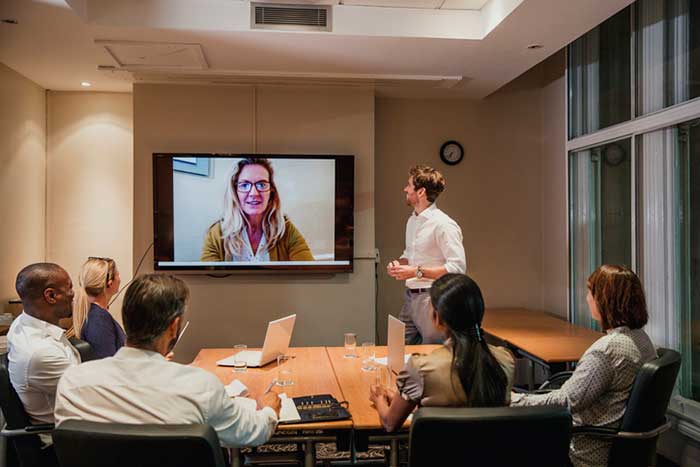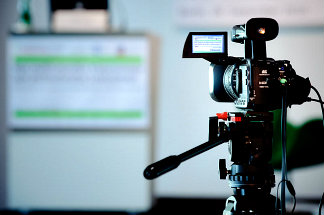The Significance of Legal Video Clip Depositions in Modern Legal Providers: What You Must Know
Legal video clip depositions have actually ended up being vital in today's legal landscape. They provide a multidimensional sight of witness statements that conventional records merely can not match. By catching both verbal and non-verbal interaction, these depositions enhance the overall understanding of a witness's credibility. Nonetheless, the efficiency of video depositions rests on numerous aspects, including conformity with legal criteria and finest practices (legal video depositions). Exploring these aspects reveals their real significance in modern-day legal solutions
What Are Lawful Video Depositions?
Legal video clip depositions work as a crucial device in the litigation process. They entail tape-recording witness statements in a video clip format, catching both spoken and non-verbal communication. This technique permits lawyers to document the behavior, expressions, and responses of witnesses, providing a richer context for the statement. Commonly conducted in a controlled atmosphere, these depositions are led by lawyers that ask inquiries while a stenotype reporter records the dialogue. The resulting video clip can be crucial for trial preparation, as it allows lawyers to analyze the credibility of witnesses and fine-tune their strategies. Furthermore, lawful video clip depositions can be made use of in different lawful contexts, varying from civil disagreements to criminal situations. The auditory and visual components of video clip depositions boost the presentation of proof, making it an important component in the contemporary lawful landscape. On the whole, they add substantially to the performance and performance of lawful process.

Benefits of Video Clip Depositions Over Typical Approaches
Video clip depositions supply countless benefits contrasted to standard techniques of taking witness statements. One significant benefit is the capacity to record both audio and aesthetic aspects, offering a more thorough document of the witness's declarations. This double format enhances quality and enables attorneys to reference specific subtleties during trial prep work. Furthermore, video depositions facilitate remote participation, making it easier for witnesses that may be unavailable for in-person looks because of geographical constraints or wellness issues.Moreover, video depositions can expedite the total deposition process, lowering the moment and costs related to travel and logistics. They additionally improve ease of access, as videotaped depositions can be quickly shared among lawful teams and referenced at any kind of time. This benefit adds to much better instance administration and prep work. In general, video clip depositions represent a modern-day, efficient strategy to gathering witness testaments, aligning with the progressing needs of the legal career.
The Role of Body Movement and Tone in Testimonies

In lawful video clip depositions, body language and tone play crucial duties in conveying a witness's trustworthiness and reliability. Nonverbal cues can offer insights right into a witness's psychological state, affecting how their testimony is viewed. Comprehending the influence of these components is important for jurors and lawyers alike when evaluating the reliability of a testimony.
Nonverbal Communication Insights
While verbal communication is commonly stressed in lawful statements, nonverbal hints such as body language and tone play a vital role in conveying reliability and emotion. Onlookers of depositions might keep in mind that a witness's stance, gestures, and faces can significantly affect perceptions of dependability. As an example, consistent eye contact might indicate confidence, while staying clear of gaze might suggest deceit or discomfort. Similarly, the tone of voice-- its speed, quantity, and pitch-- can pass on feelings of sincerity or unpredictability. Attorneys have to be in harmony with these nonverbal signals, as they commonly provide important context that enhances talked words. Recognizing these subtleties can enhance the performance of depositions and affect the outcome of legal proceedings.
Emotional Tone Effect
The psychological tone conveyed during legal testaments significantly influences just how a witness is viewed. Body language, singing inflections, and face expressions play vital functions fit the story of a statement. A witness showing self-confidence through stable eye get in touch with and a calm tone can impart a feeling of reliability and interaction. On the other hand, indications of anxiousness, such as fidgeting or a shaky voice, may lead to uncertainty regarding their account. The nuances of emotional expression can influence the interpretation of realities, making it crucial for lawful specialists to identify these cues. In video clip depositions, the acoustic and visual elements integrate, emphasizing the value of psychological tone in sharing sincerity and reliability within the lawful procedure.
Integrity and Credibility
A crucial consider establishing reliability and trustworthiness throughout testaments hinges on the witness's body movement and tone of voice. Observers typically depend on non-verbal signs-- such as eye contact, stance, and gestures-- to evaluate a witness's genuineness. For example, a witness that maintains eye get in touch with and presents open body language may be viewed as more trusted and sincere than one that stays clear of eye get in touch with or shows up closed off. In addition, intonation plays an important function; a consistent, tranquil tone can reinforce the reliability of the testimony, while changes in pitch or volume may raise doubts. Inevitably, the mix of body movement and singing tone significantly influences how a witness's statements are received and interpreted in a legal context.
Finest Practices for Carrying Out Video Clip Depositions
Performing video depositions calls for careful preparation and implementation to assure a clear and reliable presentation of testament. First, it is necessary to choose a peaceful, well-lit area to lessen disturbances and protected optimal video top quality. The tools must be examined ahead of time, including cameras, microphones, and lights, to prevent technological concerns during the deposition.Next, parties included must assess the layout and treatments in advance, making certain that every person comprehends their functions. The deponent must be oriented on the procedure, including how to react clearly and concisely.Additionally, keeping an expert behavior throughout the session is necessary. This consists of refraining from speaking over one another and validating that all inquiries are guided appropriately. Finally, it is important to videotape the deposition in a format that permits for very easy playback and evaluation, maintaining the stability of the statement for future usage.
Legal Considerations and Compliance Issues
Just how do lawful factors to consider and conformity concerns impact the effectiveness of video depositions? Legal professionals must navigate a complicated landscape of guidelines, ensuring that video depositions abide by jurisdictional guidelines and standards. Conformity with laws concerning personal privacy, permission, and videotaping methods is essential. Obtaining explicit consent from all events entailed is essential to prevent lawful repercussions.Additionally, the admissibility of video proof in court can hinge on conformity with step-by-step demands. Guaranteeing that the devices made use of meets technological criteria is additionally vital, as poor top quality can undermine the deposition's reliability.Moreover, attorneys must understand any particular state laws that regulate video clip depositions, as these can vary considerably. Failing to attend to these considerations can not only threaten the integrity of the deposition but also impact the general case method, eventually impacting the customer's lawful outcomes.
Exactly How Video Clip Depositions Impact Jury Assumption
While video depositions can work as powerful tools in lawful proceedings, their influence on court perception is considerable. The aesthetic and acoustic elements of video recordings supply jurors with an extra comprehensive understanding of witness demeanor, integrity, and psychological responses. This multimedia technique can improve the jurors' capacity to description examine the reliability of testimony look here contrasted to traditional text-based transcripts.Moreover, video clip depositions allow jurors to observe body language, tone of voice, and faces, all of which can impact their analysis of the witness's statements. The existence of a witness on screen can humanize them, promoting compassion and link, which might persuade jurors' point of views. Alternatively, a witness that shows up undependable or evasive on video may lead to negative perceptions that influence a jury's choice. Eventually, the vibrant nature of video clip depositions plays an essential role in shaping how jurors translate proof and reach their judgments.
The Future of Video Clip Depositions in Legal Method
As improvements in modern technology continue to improve the lawful landscape, the future of video clip depositions is poised for considerable advancement. Technologies such as synthetic intelligence, online fact, and enhanced video conferencing devices are anticipated to streamline the deposition process and improve accessibility. Attorneys might make use of AI-driven analytics to assess witness integrity and situation stamina much more effectively.Moreover, the integration of online truth might enable juries to experience immersive simulations of depositions, supplying much deeper context and understanding. Additionally, the trend toward remote depositions is likely to continue, providing higher versatility for customers and attorneys alike.As remote job ends up being significantly normalized, video clip depositions will likely end up being conventional practice, reducing costs and time restrictions linked with conventional approaches. Overall, these technological innovations promise to enhance the efficiency, efficiency, and availability of video depositions in lawful practice, eventually transforming exactly how lawyers plan for trial.
Regularly Asked Questions
Just How Much Do Lawful Video Depositions Commonly Cost?

Can Video Depositions Be Made Use Of in Any Kind Of Kind Of Situation?
Video depositions can be used in different kinds of cases, consisting of civil, criminal, and household legislation. Their versatility enables attorneys to present witness testimonies efficiently, adapting to the details demands of different lawful circumstances.
What Devices Is Required for a Video Deposition?
To perform a video deposition, necessary tools includes a high-quality camera, microphone, lighting, and a dependable recording gadget. Furthermore, a computer system with editing and enhancing software application might be needed for post-production and formatting the final video.
The length of time Does a Normal Video Clip Deposition Last?
A normal video clip deposition lasts between two to four hours, depending upon the intricacy of the instance and the variety of inquiries presented. Extended sessions may take place, yet breaks are typically incorporated for participant comfort.

Are Video Clip Depositions Admissible in Court?
Video depositions are usually permissible in court, provided they stick to lawful standards and regulations of evidence. Their usage enhances quality and preserves witness testament, assisting in the judicial procedure throughout hearings and trials. Lawful video clip depositions have ended up being vital in today's legal landscape. Furthermore, legal video depositions can be used in numerous lawful contexts, ranging from civil disagreements to criminal cases. Additionally, video depositions try these out facilitate remote involvement, making it less complicated for witnesses who might be unavailable for in-person looks due to geographical constraints or health and wellness issues.Moreover, video depositions can accelerate the general deposition process, lowering the time and costs linked with traveling and logistics. Making certain that the tools used satisfies technological standards is likewise essential, as bad top quality can weaken the deposition's reliability.Moreover, attorneys should be aware of any kind of certain state legislations that control video depositions, as these can vary significantly. In addition, the pattern towards remote depositions is likely to continue, supplying greater flexibility for customers and attorneys alike.As remote work comes to be significantly normalized, video depositions will likely come to be basic technique, minimizing expenses and time restrictions associated with conventional methods.